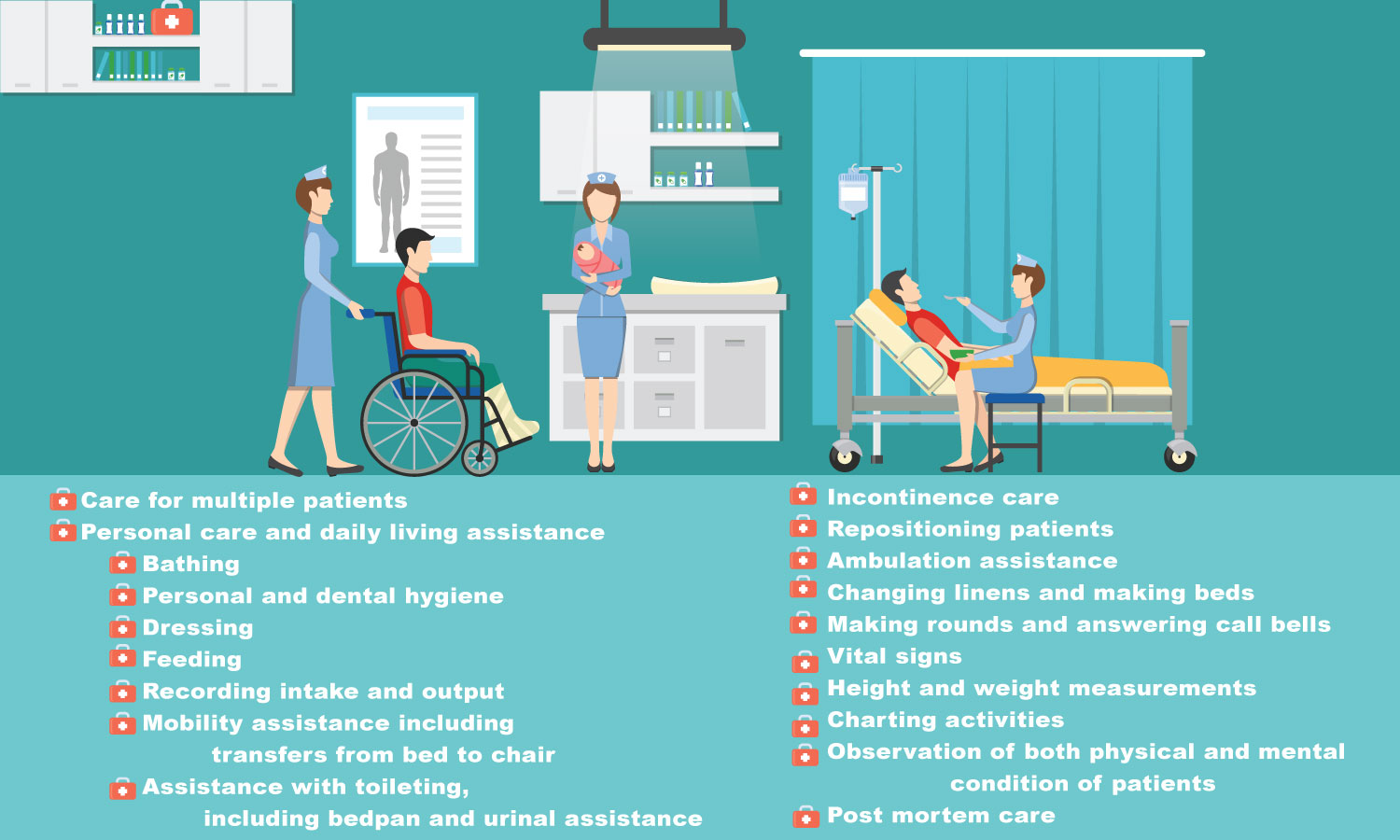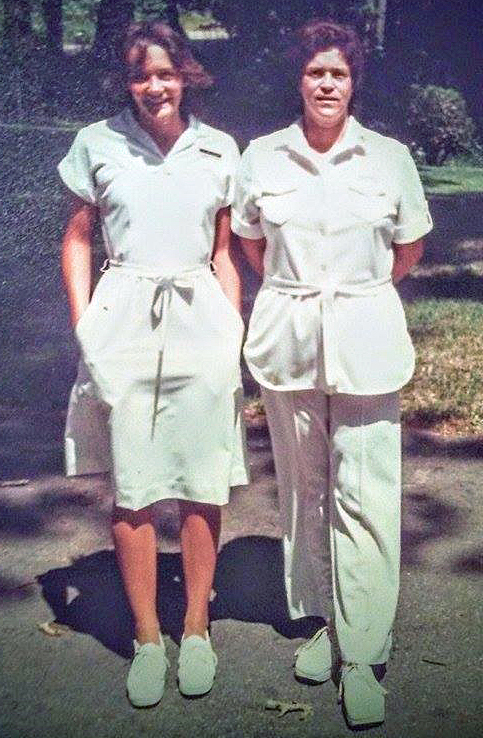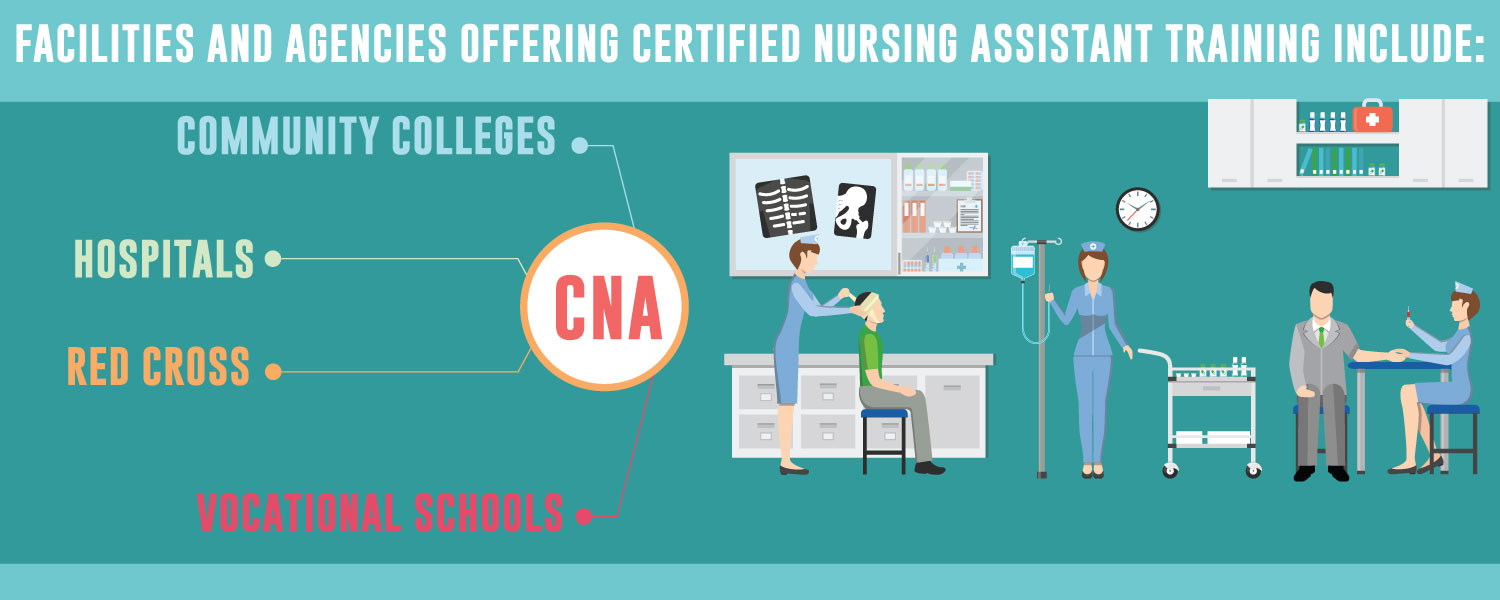Certified nursing assistant, eh?
Oh man. Being a certified nursing assistant, also known as CNA, takes a very special person. It's not a job for everybody.
So, is it a job for you?
Maybe!
Here are a few questions to ask yourself:
Are you an empathetic and compassionate person? Of all the qualifications, those two are of the utmost importance.
Can you deal with "gross" stuff?
Do you have the emotional fortitude to cope with death regularly?
These are just some basic things you should consider if you're thinking any job in healthcare, but especially for nursing assistant positions. CNAs are on the front lines -- the trenches!
If you answered yes to those questions, stay with me. You'll want to finish this article.
If you answered no, stick with us anyway.
It's true; not all superheroes wear capes.
What Do Certified Nursing Assistants Really Do?
What a Certified Nursing Assistant does daily depends on where he or she is employed. However, generally speaking, CNAs provide personal care and assistance with daily living tasks.
Certified nursing assistants are also trained in taking vital signs and performing some minor procedures under the direction of the registered nurse or licensed practical nurse.
So, let's dig a little deeper.
Job responsibilities
The job responsibilities of a certified nursing assistant can vary by not only location but also the level of certification and continuing education credits earned.
We will get into more about that later...
However, in general, CNA job responsibilities will include:

Whew!
That's quite a list.
And, that just barely touches what is involved with being a certified nursing assistant.
Beyond the job description
There is a substantial emotional investment with this job, which is both beautiful and sometimes heartwrenching.
There are days when you'll feel as though you really made a difference in someone's life. And, that is an exquisite feeling!
And, there are days when it will feel as though your heart was ripped out and stomped on.
Both exist.
Some days, you'll report for duty and go through your routine of filling water pitchers, taking vital signs, changing beds, helping with baths, and assisting people to the bathroom -- and then go home and not give work another thought until your next shift.
Other days, you may find you have to get someone else to cover your call bells because you've got a patient who is about to draw her last breath and you don't want her to be alone.
On those days, you'll be taking a bit of work home with you, and you'll shed a few tears.
Where Do Certified Nursing Assistants Work?
You'll likely be surprised at all the options available for certified nursing assistants. With this certification, you can work in a skilled nursing facility, hospital, an assisted living facility, or even visit patients in their own homes.
Often, new CNAs enter the workforce by starting in skilled nursing facilities, otherwise known as nursing homes. These jobs provide plenty of hands-on experience.
Once that experience is gained, many people then move on to work in a hospital.
Based upon where you work, your title may be slightly different than "certified nursing assistant."
Keep reading.
You're going to want to know this before you start your job search.
Tales from the Trenches
"In 2007 my husband, who was only 40 years old, was diagnosed with end stage melanoma which had spread to his lymph nodes. I used my years of training and education to care for him, and despite the emotional toll that it took on me as a person, I was determined to give him the best quality of life, no matter what. Numerous surgeries that completely and totally disfigured a once vibrant, athletic man resulted in wound care and several dressing changes each day, radiation and chemotherapy left the man I loved even sicker rather than help him, and finally, it was time to accept the fact that he wasn’t going to get well.

Kim and her mother. Image via: nahcacna
My Mom and I talked daily on the phone, with her guiding me, supporting me, offering me words of encouragement and advice, and when she felt that I was strong enough, she told me it was time to begin letting go. I learned at that point, what Hospice is, and with great trepidation allowed strangers to come into my home and teach me what it meant to allow the man I loved, the father of my children, to die with dignity and respect. At the age of 41, my husband died at home, with me by his side. A day that I will never forget. A day that changed the way I understood the meaning of what being a caregiver truly meant."
-Kim Rockwood, CNA
Nursing assistant
While "nursing assistant" is the generic title for CNAs, you'll often find job listings for a nursing assistant from skilled nursing facilities.
Think long term care facilities.
Nursing homes.
A day in the life of a nursing assistant at this location will involve having a large number of residents to care for on a shift. But, you'll gain a ton of experience and make a difference in the lives of people who really need you!
Home health aide
A home health aide is a nursing assistant who visits patients at home to provide personal care and assist with daily living activities. Home health aides may help with bathing, do some light housekeeping, and even do some grocery shopping for the client.
This service is so vital for two reasons:
Shorter hospital stays are possible when a nurse or aide can visit the client at home for personal care and things like dressing changes after surgery.
Elderly clients can stay in their own homes longer, as they can receive the needed care from the comforts of their own home rather than having to live in a facility.
Home health aide visits can range from a stay that is less than an hour, to working a full eight-hour shift with one client.
Hospice aide
A hospice aide is a skilled nursing assistant who provides end of life care. Typically patients on hospice have a prognosis of fewer than six months to live.
Hospice focuses on the patient's and their family's comfort and is considered one of the ways people are able to experience death with dignity.
Hospice care can be provided in a facility setting or at the patient's home.
Patient care tech

patient care tech. Image via: excelsiorhealthcareacademy
In many hospital settings, a nursing assistant or aide is called a patient care tech or PCT. The basic certification required for this position is for CNA. However, there are often additional certifications needed for the job.
Example:
Some hospitals may require PCTs also to have phlebotomy certification so they can perform blood draws.
Pros and Cons of Being a Certified Nursing Assistant
As with all jobs, a certified nursing assistant position has pros and cons.
To honestly decide if this is something you want to do, you need to know them.
So, let's get started.
Pros
If you are a caregiver by nature, becoming a certified nursing assistant could be perfect for you! There are many rewards in giving of yourself in this way while also earning a living.
There are other pros to being a CNA, though.
Like:
Shift work. If you desire a job that you can work evenings, nights, or weekends, this one has it! Also, some hospitals now run on a 12-hour schedule which means you may only work three days per week.
No day is the same! You'll experience new things every single day. This work is very fluid.
However, this job isn't all rainbows and butterflies. There are some drawbacks.
Cons
For one, the pay is not equitable to the work. Certified nursing assistant pay is generally lower with the national median average income for this position sitting at $26,590.
Obviously, this is very dependent upon location and employer.
Another thing that can be seen as a con is how physical this job is. While some people may really appreciate getting their workout in during the workday, the physical demands of this job are considerable.
If you're a small person attempting to lift a 200-pound client, this can put much strain on your body.
Another con to consider:
Wardrobe expenses.
You will be required to wear scrubs that are specific to your workplace. These are usually not provided. Employers may have particular colors or prints they require you to purchase, and there is no standard.
This means when you leave one employer you may have to buy an entirely new set of uniforms.
You'll also be spending much time on your feet. As such, quality shoes are required which is another expense.
Tales from the Trenches
"I was working as a nurse aide in the ER a few years ago and one night a patient came in claiming he had a bug in his ear. The doctor on duty was deathly afraid of bugs, poor guy. So he tried to see in the ear with just his eyes, but he didn’t see anything. He grabbed otoscope to check it out and lo and behold – a live cockroach was nestled in the man’s ear.

Assisting the patient with a smile. Image via: cna
The poor doctor went white as a sheet, exited the room, and bent over the counter with his head in his hands. I offered to help, but he valiantly said no, he would remove it, and stood up and walked back in, tweezers in hand. He plucked the cockroach out successfully, but dropped it on the floor as soon as he saw it, and that bug crawled RIGHT UP THE DOC’S PANT LEG!
The poor man freaked out and went running around the halls shaking his legs and hitting himself incessantly. He finally shook the bug out and squashed it with his shoe. He immediately looked up at me, who had seen the whole thing and said “Do NOT say anything about this,” then walked back into the room to apologize to the patient."
How to Become a Certified Nursing Assistant
Certified nursing assistant training is an accessible program no matter where you live.
These training programs can be as short as a month to as long as 16 weeks, depending on the state. There are even online options available.
Most of these classes will provide you with hands-on experience and training. Upon completion of the course, you will be required to take a state exam for your certification.

Facilities and agencies. Image via: everynurse
Educational requirements
To enter into a certified nursing assistant training program, you must have your high school diploma or GED. Also, some schools require CPR certification before enrollment, although some schools will include it during your training.
While not an educational requirement per se, programs also may say specific health requirements must be met, like a tuberculosis screening and proof of certain vaccinations.
Skills training
Every state has slightly different requirements for their certification tests. However, most follow a very similar set of minimum skills for certification.
Fortunately, there are a plethora of YouTube videos available that cover the necessary skills for certified nursing assistants.
This video is nearly two hours long, but it includes almost everything you will need to know to pass the certification test in most states.
Is This the Career for You?
So, are you still interested in becoming a certified nursing assistant?
Yes?
In my tenure as a nursing assistant, I met clients who I still remember 25 years later. It was, without a doubt, the most rewarding job I ever had.
With that said, I also experienced things I never dreamed of.
Well, let's get down to some of the nitty-gritty details just to be sure.
OMG poo!
Once, I was giving a patient an enema in the hospital. Now, hospital enemas are a bit different than at home Fleet® enema that you purchase at your local Walgreens.
A hospital enema involves a bag of warm water on an IV pole, a long tube, and lubricant. The patient lies on their side on the bed. Of course, this then requires them to walk to the bathroom while trying to keep all that water inside!
This is no easy task for the middle-aged patient but is especially challenging for the 90-pound 95-year-old who has mobility issues.
Oh yes, I ended up being splattered with hot, liquid feces.
I'm telling you, this job is not for the faint of heart!
Your job continues, beyond comfort for some
Sadly, I also watched patients die while working on a medical/surgical unit in the hospital and while working as a hospice aide.
It's true. That takes an emotional toll in and of itself, but part of your role as a nursing assistant is also performing post mortem care.
Perhaps you're asking yourself what that means exactly.
Well...
Post mortem care consists of preparing the patient after they have died, so they are presentable for family viewing. This may mean you need to clean up bodily fluids released during the dying process, or clean tubes or IVs, cover wounds, put dentures in their mouth and comb their hair.
You'll also need to change the sheets and tidy the room.
In other words, you'll be required to provide the same level of care to your patient while they are living and after they pass away.
This can be a bit of a challenge and something you should be comfortable within this career.
Unwanted advances
Last but not least, another aspect of being a certified nursing assistant that isn't often spoken about is the awkward situations where a patient who may or may not be completely cognitively aware, gets...
...a bit "handsy."
Especially during toileting or bathing.
It happens.
A lot.
And, you've got to figure out a way to deal with it.
If the patient is unaware of their surroundings, you still need to tell them it's inappropriate, and then try to figure out ways to keep them distracted enough while you complete the task.
However, it can be a little different when the patient is fully aware of what they are doing.
I once had a patient who was very much aware of his surroundings. As I was helping him with his bath, he grabbed my rear end.
Be prepared for these things.
I was prepared, as I knew it would eventually happen with someone.
I handed him his washcloth and said, "Well, it looks like your arms and hands are working just fine. Here you go, Mr. Smith, I'll let you finish up."
That's usually all it really took.
Involuntary reactions
There are often times when involuntary things happen as well, such as erections. This can be particularly true if you have a male client who is younger.
Such situations must be handled with the utmost discretion and respect.
These four scenarios were mentioned specifically because they can create much discomfort. There is a list a mile long of scenarios you may run into that make you uncomfortable as a nursing assistant.
It's up to you to determine if you can handle such things with grace, as that is a huge part of the job.
Tales from the Trenches
"I have a poop story to share too. I worked in LTC when I was 18/19. I had this patient named Ethel. Oh Lord was she a mess!! She didn't speak to anyone but she grunted all day long as she wheeled herself around. One night I went into her room and she was just sitting in her chair next to her bed. I said, "come on Ethel, it's time for bed". Well, Ethel fancied those long moo moo type house dresses. Not being able to get herself into bed, I put my arms underneath her and got into the position to pivot and move her. I pick her up, my left leg between her legs, and realize that Ethel has the runs. Boy, did she ever have the runs!!

Walking with patient. Image via: berkeltraininginstitute, allnurses
Immediately there was poop everywhere!! On the floor, on the chair, on Ethel and on me. Keep in mind, we are still in the "ready to move" position. She started to slip in the poop and I had to keep her from falling by resting her on my leg. Ethel slid all the way down my leg!! I ended up on the floor with Ethel and her bowel contents all over me!! It was the biggest mess I have ever seen. When the nurse finally heard my cries for help, she came in and nearly peed her pants she was laughing so hard. Poop EVERYWHERE, and me covered up in it with Ethel on top of me doing her grunt. Suffice it to say, Ethel and I both got a shower!!"
Tips for Being a Certified Nursing Assistant
So, you've decided this may still be the career for you.
Awesome!
Certified nursing assistants are in high demand. It is a noble career that is both physical and emotionally demanding.
We need more people like you!
Here are a few tips to keep in mind when you start working
1. Always carry a notebook or paper. Even if you are working in an environment that uses electronic charting, there are times when you will need just to jot something down.
2. Never, ever go to work sick. If you do, you run the risk of exposing some of the most vulnerable people to an illness that could ultimately kill them.
3. Keep a kit with you all the time that has the basics you'll need for your shift: a pen, paper, gloves, medical tape - all should easily fit into your scrub pockets.
4. Work as a team with other nursing assistants -- especially for patients who are more difficult to lift and position. Save your back! You're going to need it for a long time.
5. Always, always, always, keep a spare set of scrubs in your car or work locker if you have one. You never know what mishap may take place that requires a new set of clothes.
Ready? Set? Go for it!
If you're still here reading this and this sounds like the job for you, then you're likely on the right path!
Becoming a nursing assistant is a rewarding, noble, and necessary career.
Whether you're becoming a certified nursing assistant is the end goal, or just the first stepping stone to a career as a licensed practical nurse or registered nurse and beyond, one thing is for sure:
You will gain life experiences in this profession that will touch your heart and soul for all eternity. And, that is a fantastic thing!
Why do you want to become a nursing assistant? Are you a seasoned nursing assistant with advice for someone considering your profession? Tell us about your experiences in the comments!


Hello, I want to work in your company on a voluntary basis, can you offer me anything?
This leaves us just two years to transform our industry from being one of the fastest growing sources of greenhouse gas emissions and start to bring our
grade school
Getting started with e-power – model airplane news electricity and magnetism worksheets
Great Content,
I agree with you on your opinion, And
If you will write again please notify me.
Thanks
Minnesota dental hygienists can enroll in any of the available Minnesota dental hygienist schools to earn an associates degree in dental hygiene. These
Dental hygienist assistant salary
According to the University of California, San Francisco, there are more than 600 neurological disorders. Neurological disorders are diseases that affect
http://magdalenabus.tk/page/painful-burning-tongue/
Your style is very unique in comparison to other folks I have read stuff from. I appreciate you for posting when you’ve got the opportunity, Guess I’ll just bookmark this site.
The staff at Health Blessing have been trained in the Thai techniques of Massage and Reflexology Foot Massage. The owner is graduated from Thailand famous Wat Pho Massage School. The owner is graduated from Thailand famous Wat Pho Massage School.
Reflexology nearby
Located in a bacteria-laden environment that is close to the teeth and jawbone (and not to mention close to the sterile brain), the oral cells wear themselves out and have to re-grow at a very fast pace in order to heal quickly and to marshal the resources of the immune system to keep nearby organs free of bacteria. Often a whole new group of oral cells is replaced every three to seven days
Molar teething symptoms